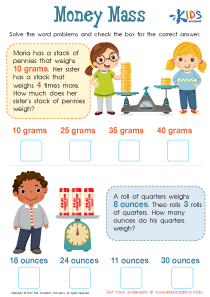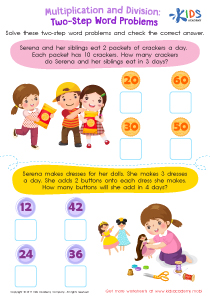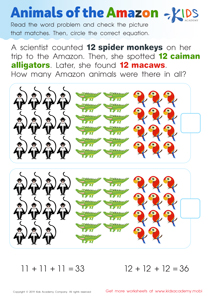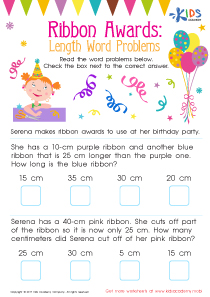Extra Challenge Time Word Problems Worksheets for Ages 3-5
1 filtered results
-
From - To
Introducing our Extra Challenge Time Word Problems worksheets, expertly crafted for children aged 3-5 years. Ideal for young learners, these engaging homeschool homework sheets are designed to hone early math and critical thinking skills through fun and interactive word problems. Each worksheet is meticulously tailored to help preschoolers understand concepts of time and sequencing while boosting their problem-solving abilities. These printable sheets are perfect for parents looking to enrich their child's learning experience at home. Encourage your little ones to embrace learning with excitement and confidence, setting a solid foundation for future academic success.
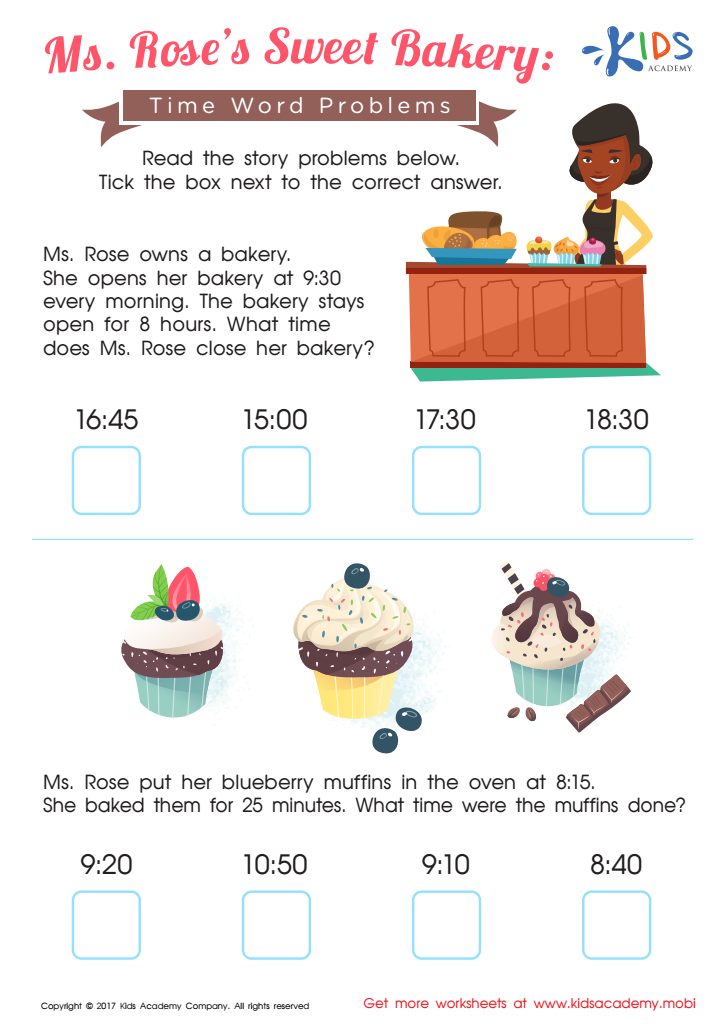

Ms. Roseв's Sweet Bakery Time Worksheet
Why Extra Challenge Worksheets on Time Word Problems Are Essential for Young Learners
In the critical early years of child development, ages 3 to 5, fostering an understanding of basic concepts like time is not just useful but essential. Learning worksheets, specifically those that challenge young minds with time word problems, play a pivotal role in this educational journey. Here's an exploration of why these worksheets are so beneficial to preschool-age children.
1. Building a Foundation for Mathematical Thinking
Mathematics is not just about numbers; it involves understanding patterns, solving problems, and applying knowledge in practical contexts. Time word problems on learning worksheets help children make sense of numbers in relation to time, which is a daily observable phenomenon. By tackling problems that require them to calculate durations or understand sequences of events, children develop early mathematical skills that form the building blocks for more complex concepts as they advance in their schooling.
2. Enhancing Cognitive Development
Learning worksheets with time word problems stimulate cognitive development in young children. These challenges help enhance memory, improve attention to detail, and develop reasoning skills. As children think through a problem, such as figuring out the time needed for an activity or the time when an activity happens, they learn to connect abstract concepts with real-world situations, which is a critical aspect of cognitive development.
3. Encouraging Real-Life Applications
Understanding time is fundamental to daily activities. Whether it's knowing when it’s lunchtime or how long it takes to get ready for school, time is omnipresent in a child's daily routine. Learning worksheets with time word problems help children apply their learning in real-life scenarios, making them more independent and confident. For example, being able to anticipate when a playtime starts based on a clock reading is a significant achievement for a preschooler.
4. Supporting Language and Communication Skills
Time word problems on learning worksheets often involve a narrative element — they might tell a story where characters perform activities within different time frames. This storytelling aspect not only makes the problem-solving process engaging but also enhances language skills. Children learn new vocabulary related to time and sequencing, and as they discuss their thoughts and explain their reasoning, they develop essential communication skills.
5. Promoting Persistence and Problem-Solving Attitude
Learning worksheets are designed to be challenging but achievable, which is crucial in fostering a problem-solving attitude among young learners. By engaging with time word problems, children learn to persevere through challenges, think creatively, and enjoy the satisfaction of solving a problem by themselves. This persistence is a critical skill that benefits all areas of learning and personal growth. It teaches children that not every problem has an immediate solution and that effort and thinking are essential parts of finding an answer.
6. Tailoring to Individual Learning Paces
One of the significant advantages of using learning worksheets is their adaptability to individual learning speeds and styles. Time word problems can be designed with varying levels of difficulty, allowing educators and parents to customize the learning experience according to the child's developmental stage and understanding. This personalized approach ensures that each child feels challenged yet not overwhelmed, fostering a positive learning environment and encouraging continual growth.
7. Facilitating Collaborative Learning
Although designed for individual use, learning worksheets with time word problems can also be used as a collaborative tool. Teachers can organize group activities where children work together to solve problems, discuss different strategies, and share their reasoning. This peer interaction is beneficial for social skills development, as children learn to listen, share ideas, and work together towards a common goal. Collaboration in learning also introduces different perspectives and solutions to problems, enriching the learning experience.
8. Monitoring Progress and Understanding
For educators and parents, learning worksheets serve as effective tools for monitoring a child’s progress and understanding of time concepts. By observing how a child approaches time word problems, adults can gauge comprehension levels and identify areas needing further support or enrichment. Feedback can then be tailored to help the child improve or challenge them further, ensuring continuous and balanced development.
Conclusion
Learning worksheets with extra challenge time word problems are more than just educational tools; they are foundational elements that support early childhood development in numerous ways. They help build mathematical reasoning, enhance cognitive skills, and apply learning in meaningful ways, all while making learning engaging and relevant. For young children, particularly those between the ages of 3 to 5, these worksheets are not just about learning to tell time but about developing a broad range of skills that are vital for all future learning endeavors. By integrating these worksheets into early education, we provide children with a robust foundation for academic success and lifelong learning.
 Assign to My Students
Assign to My Students








